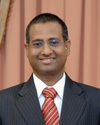Iran presidential vote not free, fair: UN rights envoy

AFP
June 13, 2013
MADRID: Iran's presidential election has been neither free nor fair as Tehran has silenced journalists and opposition leaders in the run up to Friday's vote, a United Nations human rights investigator said in Spain.
Ahmed Shaheed, UN special rapporteur on the human rights situation in Iran, warned in March that he was concerned that the outcome of the election would lack legitimacy because dozens of Iranian journalists were behind bars and hundreds of political prisoners remained in custody.
"I absolutely think the fears were warranted as has been bourne out by events," he told AFP on the sidelines of the World Congress against the Death Penalty.
"The mass disqualification of candidates, especially for reasons that were not transparent and that appear to be quite unreasonable, for one violates the right to political participation.
"A number of high profile politicians were not able to run in the election. Then there is the fact that parties have been banned, former leaders are in detention, all of that adds to a lack of space for people to conduct a free and fair election," Shaheed added.
"Elections are free and fair not only because the vote has not been rigged but because the general environment for the campaign is also friendly towards people's expression of liberty," he said.
On May 21, Iran's Guardian Council, an unelected watchdog controlled by religious conservatives tasked with vetting candidates, approved only eight of the 686 people registered to stand in the June 14 presidential election.
All 30 women candidates, as well as a number of key political figures, were disqualified.
Opposition leaders Mehdi Karoubi and Mir Hossein Mousavi, both candidates in the 2009 presidential election, are under house arrest following mass protests over alleged fraud in the return to power of President Mahmoud Ahmadinejad that year.
In a report presented to the United Nations in March, Shaheed, a former Maldives foreign minister, said Iran had failed to investigate "widespread, systemic and systematic violations of human rights".
He also called on Tehran to immediately release hundreds of human rights advocates, journalists, lawyers and other political prisoners held for exercising their right to freedom of expression during protests over alleged fraud in Ahmadinejad's re-election in 2009.





